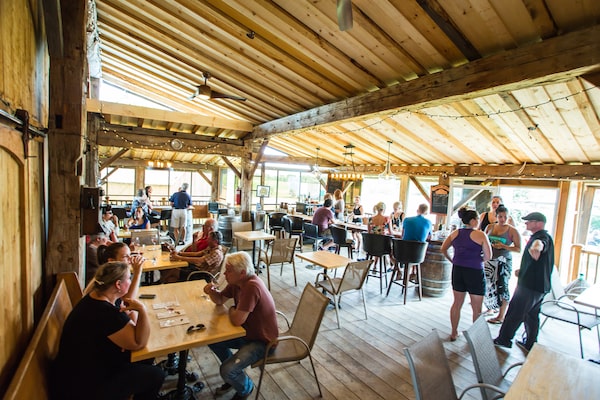
Karlo Estates, in Ontario's Prince Edward County, is the first winery to be certified by VegeCert as vegan-friendly.
When you consider any of the presumed classic food and wine pairings – oysters and Chablis, Stilton cheese and Port or steak and cabernet sauvignon – they’re only perfect matches if you like both sides of the equation.
If you enjoy a strict plant-based or vegan diet, all are non-starters – possibly on both the food and wine sides. While it might come as a shock given it’s a product of grapes, wine isn’t necessarily vegan-friendly.
“So many people don’t understand that not all wines are suitable for vegans,” says Jennifer Huether, a master sommelier based in Toronto who has been taking an active interest in vegan wine pairings over the past few years.
Huether explains for many being vegan isn’t a diet, it’s a lifestyle. It’s not merely an issue about what they ingest, but a sincere belief that humans shouldn’t exploit or harm animals in any fashion. “Beyond the animal products that might be used in the clarification of wine, there’s also the adhesives used in the labelling process to consider or whether animals, like horses or sheep, are employed in the vineyard work.”
The principle of winemaking, having yeast convert the sugar in grape juice to alcohol, isn’t a concern for vegans. The issue comes up when winemakers look to clarify or “fine” their finished wine to give them that clear, bright, jewel-like clarity.
Binding agents or clarifiers are used to attract suspended solids (proteins, tannins and other molecules) left over after fermentation that make the wine hazy and possibly taste bitter. The most common fining agents are derived from casein (milk protein), albumin (egg whites) or animal proteins (gelatin or isinglass, the latter being a fish by-product).
Because three of the most traditional fining agents are common allergens, you may have noticed the warning “may contain milk, eggs or fish” on the back label of some international wines, notably ones from Australia or New Zealand. Canadian winemakers aren’t required to specify which processing aids were used.
As part of her work with Toronto-based promoter and writer Priya Rao on an ongoing series of events that celebrate the art of pairing vegan wines and foods, Heuther has been actively combing what little material is available.
“Just because you eat a plant-based diet, doesn’t mean you don’t like wine,” she says. “I found it fascinating that no one is really addressing this subject.”
Huether says she’s been looking to identify food and wine pairings that create the elevated experience that someone would experience with, say, a great bottle of Bordeaux and a lamb dish.
“We’re still discovering as we go,” she says. “With vegan dishes you have different sugar levels, spices and umami levels, it’s a fun challenge.”
Most of successes thus far have been recipe based, but Heuther is happy to share some guiding principles for anyone looking to get the most of a vegan wine and food pairing. She and Rao are hoping to have a vegan food and wine pairing e-book compiled for the coming holiday season. More information is available at thesocialherbivore.co.
- Go gamay Simple, fruity and enjoyable Beaujolais tends to work with a wide variety of vegan dishes. “The high acidity, lower tannins and lighter flavours work with so much,” she says.
- Coconut and riesling The taste of a coconut cashew brie-style cheese with an off-dry riesling helped unlock a flavour combination that is working across a spectrum of dishes. “It’s to die for,” Heuther says.
- Beware big reds “It’s a struggle to find good matches for big, tannic red wines,” she says. “Using charring or grilling as a cooking method and flavourful marinades with salt and umami helps, but that style of wine is the trickiest challenge.”
The wines recommended this week are all vegan-friendly as professed by the producers. Outside of Karlo Estate in Ontario’s Prince Edward County, no governing body has confirmed these claims. Many wine producers don’t use animal-derived products, but fail to mention it. If you have any concerns about how your favourite winery makes its wine, it’s best to get in touch and see what they have to say.
Cave Spring Cellars Riesling 2017 (Canada)
SCORE: 90 PRICE: $15.95
Made in Cave Spring’s crowd-pleasing house style, this refreshing riesling is marked by mouthwatering sweet and sour citrus flavours. Zesty with a balancing sweetness, it makes a terrific aperitif or food-friendly (and vegan-friendly) dining companion. Available in Ontario at the above price, $17.99 in Manitoba, direct shipping to Alberta or British Columbia through cavespring.ca.
Domaine Bousquet Malbec 2018 (Argentina)
SCORE: 88 PRICE: $13.95
Here’s an organic and vegan-friendly malbec from Tupungato in the premium growing region of the Uco Valley. This easy to appreciate dry red offers a mix of berry and spice notes, with a fresh and lively character. It’s a solid value that’s ready to enjoy during the next year or two. Available in Ontario at the above price, $16.04 in Manitoba.
Fort Berens Estate Winery Chardonnay 2018 (Canada)
SCORE: 88 PRICE: $19.99
Fort Berens co-founder Rolf de Bruin explains the winery in Lillooet doesn’t use animal products in the vineyard or winery operations. Produced mostly from estate-grown fruit that’s blended with purchased chardonnay, this ripe and refreshing white is nicely balanced. Drink now. Available direct from the winery through fortberens.ca
Karlo Estates Malbec Estate 2017 (Canada)
SCORE: 90 PRICE: $39
Karlo Estates was the first winery to certified by VegeCert, a Canadian body that conducts audits to confirm that production methods and supplies are vegan-friendly. The Prince Edward County winery produces a compelling range of estate-grown wines, including this distinctive malbec that reveals a sweet core of dark fruit that gains interest from herbal, earthy and spice notes. Available direct from the winery through karloestates.com
Yalumba The Strapper 2016 (Australia)
SCORE: 91 PRICE: $19.95
This juicy and generous Barossa red is a winning blend of grenache, shiraz and mataro (a.k.a. mourvedre). The result is a fresh and flavourful character that displays a pleasant array of mint, herbal and ripe red fruit notes. Vegan friendly. Available in Ontario at the above price, $22.11 in Manitoba, various prices in Alberta. The similarly enjoyable 2015 vintage is $24.99 in British Columbia.
Yalumba Y Series Viognier 2018 (Australia)
SCORE: 89 PRICE: $14.95
Yalumba has always had a special affinity for the viognier grape, but in recent years has outdone itself. This is an exciting version of the entry level Y Series label, with succulent fruit and that exotic lemongrass and floral charge you hope to find in top-quality expressions. Vegan-friendly. Available in Ontario at the above price, $17.49 in British Columbia, $18.99 in Saskatchewan, $14.95 in Quebec and various prices in Alberta.
Wente Morning Fog Chardonnay 2017 (United States)
SCORE: 88 PRICE: $19.95
Appealing fruity and fragrant, Wente Morning Fog chardonnay is made in a crowd-pleasing style. The oak spice flavours are nicely integrated into the mix of floral, cream and citrusy notes. Vegan friendly. Available in Ontario at the above price, $19.49 in Manitoba, various prices in Alberta and British Columbia.
Plan your weekend with our Good Taste newsletter, offering wine advice and reviews, recipes, restaurant news and more. Sign up today.
 Christopher Waters
Christopher Waters